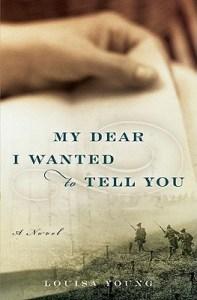
What’s it all about?:
The lives of two very different couples are irrevocably intertwined and forever changed in this stunning World War I epic of love and war.
From the day in 1907 that eleven-year-old Riley Purefoy meets Nadine Waveney, daughter of a well-known orchestral conductor, he takes in the difference between their two families: his, working-class; hers, “posh” and artistic. Just a few years later, romance and these differences erupt simultaneously with the war in Europe. In a fit of fury and boyish pride, Riley enlists in the army and finds himself involved in the transformative nightmare of the twentieth century.
While Riley and his commanding officer, Peter Locke, fight for their country and their survival in the trenches of Flanders, Peter’s lovely and naive wife, Julia, and his cousin Rose eagerly await his return. But the sullen, distant man who arrives home on leave is not the Peter they knew. Worried that her husband is slipping away, Julia is left alone with her fears when Rose joins the nursing corps to work with a pioneering plastic surgeon treating wounded and disfigured soldiers.
Only eighteen at the outbreak of the war, Nadine and Riley want to make promises to each other—but how can they when their future is out of their hands? Youthful passion is on their side, but then their loyalty is tested by terrible injury, and even more so by the necessarily imperfect rehabilitation that follows.
Moving among Ypres, London, and Paris, this emotionally rich and evocative novel is both a powerful exploration of the lasting effects of war on those who fight—and those who don’t—and a poignant testament to the power of enduring love.
What did I think?:
I’ve actually read this book once before pre-blog days, as it was part of the Richard and Judy Spring Book Club list in 2012, and if there’s ever a case for re-reading a book I state it here absolutely and positively. Not that I didn’t enjoy reading it first time around, but I think it got lost somewhere among the awesome books that were on the list that season: Me Before You – Jojo Moyes, The Help – Kathryn Stockett, Before I Go To Sleep – S.J. Watson, The Story of Beautiful Girl – Rachel Simon. You get the picture. Anyway, this is the story of Riley and Nadine, who spend most of their childhood together, despite differing backgrounds – him being poor, her family comfortably rich. Romance blossoms, but Riley is made aware from Nadine’s family that under no circumstances should he consider dallying with her, he’s just not in her class in their opinion. So Riley decides to sign up for the war, with an air of nonchalance, but also for proving himself worthy and acceptable for Nadine. They write to each other while he is at the Front, cold and stilted letters from him at first as he tries to protect both of them from the horrors of the war. However, Nadine has joined up as a volunteer nurse to help with the injured soldiers at the hospital and has no qualms having “seen it all before.” Disaster strikes (as it often does!) in the form of a terrible injury which may threaten their relationship for good.
I was almost dumbstruck by how I enjoyed this book more the second time round as previously mentioned, and it was so terribly sad that I actually had to read it in fits and spurts. I think it obviously makes a story more poignant and emotional when it is based on realism, but the real strength lies in the writing of the author, and her ability to tug at our heart strings, leaving us no choice but to have to put the book down for a while to ponder and collect ourselves. There is also a second story weaving through the narrative, that of Riley’s Commanding Officer, Peter, his wife Julia, and Peter’s cousin Rose who also works in a hospital with the injured and dying. This story related the nature of mental injury in contrast to physical disabilities, the former rarely talked about as a hazard of wartime and has only fairly recently come to light with the nature of so many PTSD (Post Traumatic Stress Disorder) casualties in war veterans. I thought that it was very important that this was highlighted in contrast with the physical traumas and think the author made an excellent job of it. Finally, I admire the way the author has told the stories of the people who remain behind and have to learn to cope with things, in particular, Julia, who is not counted on much apart from having a pretty face, and goes through quite a traumatic ordeal when the normality of her life and marriage is disrupted.
A beautiful and emotional read that will stay with me for a while so that in future, I will definitely keep an open mind about re-reading a book I found just “good,” this book is a little gem which should not be under-appreciated.
Would I recommend it?:
But of course!
Star rating (out of 5):


